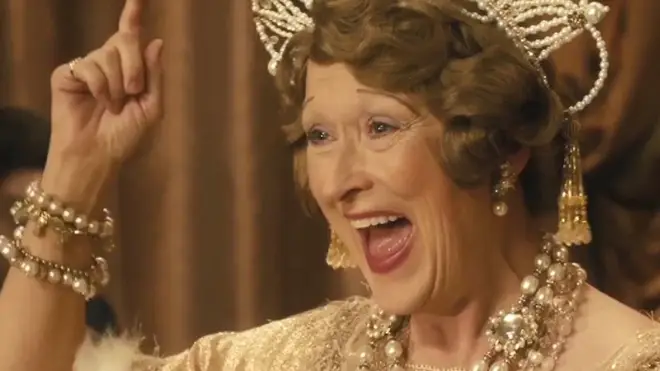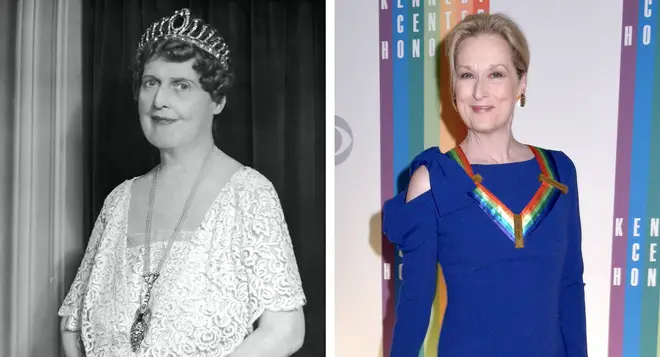On Air Now
Early Breakfast with Lucy Coward 4am - 6:30am
2 July 2021, 12:15

Florence Foster Jenkins, played by Meryl Streep in the 2016 biopic, was an American socialite and aspiring coloratura soprano. But everyone who went to her concerts was in on a strange joke: she was an absolutely terrible singer.
Florence Foster Jenkins built a career in the early 20th century on being “the world’s worst opera singer”. Her flat-by-a-country-mile top Fs, flamboyant costumes and self-parodic album titles have been the subject of fascination for years since, her legacy so enduring that Meryl Streep and Hugh Grant starred in a film about her life story a few years ago.
The daughter of a wealthy lawyer, Jenkins would sing at private gatherings organised by her husband, St Clair Bayfield (Hugh Grant), performing for friends and loyal followers who cherished and even milked Jenkins’ unwavering support for music and the arts. Knowing Jenkins’ influence, they kept their cringes and chuckles to themselves.
Eventually, the cod coloratura managed to squeeze her way – flamboyant bird wings, tiara and all – into New York’s prestigious Carnegie Hall, after which she was ruthlessly ridiculed by critics.
Two days later, Jenkins had a heart attack. She died a month later in her Manhattan home at age 76. Here’s her extraordinary story.
Read more: Florence Foster Jenkins proved you can be a terrible singer and still be absolutely awesome

Florence Foster Jenkins was a socialite from a well-off American family, who had one dream: to be a great opera singer. She watched her contemporaries, the likes of Lily Pons – played in the film by Russian soprano Aida Garifullina – in concert and was transfixed.
“I could do that,” thought Jenkins. And so, believing that her love of music could turn her into a gifted singer, she reached for the moon and grasped it with both hands.
She found a singing teacher and hired private pianist Cosmé McMoon (played by Big Bang Theory actor Simon Helberg) to accompany her lessons and with the help of her philandering husband, started to put on invite-only recitals.
Jenkins, whose father was a wealthy Philadelphia lawyer, had no trouble finding audiences willing to listen to her “singing”. She also supported young artists, who knew that her Jenkins could help them make it in the industry.
Her most famous recordings range from the lofty heights of Johann Strauss II’s ‘Laughing Song’ to Mozart’s ‘Queen of the Night’ aria, which featured on albums whose titles include the brilliant The Glory (????) of the Human Voice and Murder on the High Cs.
Jenkins, many believed, knew of her limitations as a singer – and cared not a fig.

Florence Foster Jenkins Sings "Adele's Laughing Song." Die Fledermaus
Undecided, it seems.
One of the young artists Jenkins supported, Louise Frances Bickford, later became the teacher of vocal coach Bill Schuman, who in an interview told NPR that Bickford “said that Florence was in on the joke”.
Schuman added: “She loved the audience reaction and she loved singing. But she knew.”
Mezzo-soprano Marilyn Horne disagrees. She told NPR: “I would say that she maybe didn’t know. First of all, we can’t hear ourselves as others hear us. We have to go by a series of sensations. We have to feel where it is.”
What we do know is that Jenkins was a delightfully flamboyant performer, waltzing through the audience at her recitals and throwing out bouquets of flowers. One anecdote says that she was involved in a minor taxi crash, went to scream and discovered that she could sing higher than the F sharp she had thought to be her limit. She thanked the taxi driver by sending him a box of cigars.
Florence Foster Jenkins caught syphilis from her first husband. The disease apparently affected her hearing, giving her tinnitus. Some reports even say that was what prevented her from singing in tune.

Florence Foster Jenkins - Queen of the Night by Mozart.
Talking about the film, Streep told Radio Times: “I feel like I’m a B, B+ singer – I’m very well aware of my limitations. Much as I would have liked to be a good singer after I began studying opera as a child, I gave it up very early and sort of ruined my voice with smoking, drinking and debauchery.”
Odd as it may seem for playing a character known for their terrible singing, Streep – who, herself, trained in opera – worked with a vocal coach to help her prepare for the role of Jenkins.
Twice a month for four months, Streep worked with music professor Arthur Levy. First, they learned the pieces properly. Then, they added the mess-ups. “These arias are no joke, even if you’re singing off-key,” Levy said. “Especially off-key, which strains the voice.”
Streep said she practised the ‘Queen of the Night’ aria “eight times one day. And then came back and sang it eight times the next day”.
As a result, Streep is extraordinarily good at singing badly.
Talking on Lorraine, Streep says of Jenkins’ curious technique: “She’d go off in the weirdest places and it was the particularity of her getting things wrong that was so funny. You can hear her getting ready to sing something and she spends all of her voice on the beginning of the phrase and there’s nothing left at the end, and she trails off.”

Meryl Streep as Florence Foster Jenkins - Queen of the Night aria (complete)
The film production of Jenkins’ story culminates in the amateur soprano singing the ‘Queen of the Night’ aria at New York’s Carnegie Hall. She invites a large army contingent to thank her country’s armed forces, who evidently weren’t prepared for the joke. As soon as Jenkins starts to sing, the soldiers collapse into laughter.
In real life, Jenkins really did perform at Carnegie Hall, her debut selling out within two hours. Her audiences had been begging her to perform there for years and flocked there in their masses as soon as they got the chance.
On Carnegie Hall’s website, a writer remembers how that night, “She walked onstage in these ridiculous costumes that she’d made herself. She’d throw roses out into the audience, her assistants would go out and collect them, and she’d throw them out into the audience again. The audience would not let her go home. They cheered her and clapped.”
Read more: Who was Jenny Lind, the real-life opera singer in The Greatest Showman?
Two days after the Carnegie Hall performance, Jenkins had a heart attack. And one month later, she died in her Manhattan home at 76.
In her final hour, Jenkins reportedly said: “People may say I can’t sing, but no one can ever say I didn’t sing.”
Florence Foster Jenkins, the world’s best bad singer, brought out the amateur and aspiring musician in all of us. What a legacy to have left.